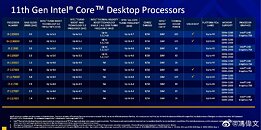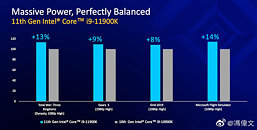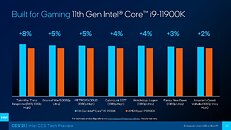Wednesday, March 10th 2021

Intel Core i9 and Core i7 "Rocket Lake" Lineup Leaked, Claims Beating Ryzen 9 5900X
Intel is planning to debut its 11th Generation Core "Rocket Lake-S" desktop processor family with a fairly large selection of SKUs, according to leaked company slides shared by VideoCardz, which appear to be coming from the same source as an earlier report from today that talk about double-digit percent gaming performance gains over the previous generation. Just the Core i9 and Core i7 series add up to 10 SKUs between them. These include unlocked- and iGPU-enabled "K" SKUs, unlocked but iGPU-disabled "KF," locked but iGPU-enabled parts, and locked and iGPU-disabled "F" parts.
With "Rocket Lake-S," Intel appears to have hit a ceiling with the number of CPU cores it can cram onto a die alongside an iGPU, on the 75 mm x 75 mm LGA package, while retaining its 14 nm silicon fabrication node. Both the Core i9-11900 series and the Core i7-10700 series are 8-core/16-thread parts, with an identical amount of cache. They are differentiated on the basis of clock speeds as tabled below, and the lack of the Thermal Velocity Boost feature on the Core i7 parts. The Core i5 series "Rocket Lake-S" parts are reportedly 6-core/12-thread.Some additional game performance slides were leaked to the web. The first one below (also posted earlier today), deals with comparisons between the i9-11900K and the previous-generation flagship, the 10-core i9-10900K. The second slide deals with i9-11900K compared to the AMD Ryzen 9 5900X 12-core processor, where it's claiming anywhere between 2% to 8% performance gains, across a broader selection of games than the comparison to the i9-10900K. The performance lead gets higher with multi-threaded strategy games like "Total War," but slims down to 2% with first-person/third-person games such as "Far Cry: New Dawn" and "Assassin's Creed Valhalla."
Sources:
VideoCardz, HXL (Twitter)
With "Rocket Lake-S," Intel appears to have hit a ceiling with the number of CPU cores it can cram onto a die alongside an iGPU, on the 75 mm x 75 mm LGA package, while retaining its 14 nm silicon fabrication node. Both the Core i9-11900 series and the Core i7-10700 series are 8-core/16-thread parts, with an identical amount of cache. They are differentiated on the basis of clock speeds as tabled below, and the lack of the Thermal Velocity Boost feature on the Core i7 parts. The Core i5 series "Rocket Lake-S" parts are reportedly 6-core/12-thread.Some additional game performance slides were leaked to the web. The first one below (also posted earlier today), deals with comparisons between the i9-11900K and the previous-generation flagship, the 10-core i9-10900K. The second slide deals with i9-11900K compared to the AMD Ryzen 9 5900X 12-core processor, where it's claiming anywhere between 2% to 8% performance gains, across a broader selection of games than the comparison to the i9-10900K. The performance lead gets higher with multi-threaded strategy games like "Total War," but slims down to 2% with first-person/third-person games such as "Far Cry: New Dawn" and "Assassin's Creed Valhalla."



99 Comments on Intel Core i9 and Core i7 "Rocket Lake" Lineup Leaked, Claims Beating Ryzen 9 5900X
Sorry, you made "burst" out laughing.
And probably very brief duration too
Default z490 settings or Intel chip power limitations are pretty much a sad joke can't even make it through R20 without throttling before the completion of it's short render lol
www.anandtech.com/show/16535/intel-core-i7-11700k-review-blasting-off-with-rocket-lake
Intel, we KNOW you're lying. The cats been out of the bag for a week now. You cant touch the 5800x most of the time, sometimes you cant even meet the 10900k, and you expect anyone to buy the "faster then 5900x" line?
Pretty much mirrors what Anandtech said. Gaming looks a bit better here vs Anandtech but that could be down to the selection of games. They also run 3200 C14 ram rather than 3200 C20 than Anandtech run so maybe RL scales slightly better with tighter timings. Pretty sure that will be tested thoroughly come launch.
I just bought an independent ice maker that runs alongside the fridge and dedicated freezer and I don’t even know what power it uses nor do I care what power the half dozen consoles, cpus, TVs etc use. I don’t think the directv boxes have ever been turned off and you want me to care about the cpu chip efficiency?
I need a gaming cpu so I’ll get the latest and pass my 10600k down the line.
3200c20 if it even exists is some real junkyard dog garbage lol
If that's the goal to have latency as high as amd is, they did well lol
It's not really all that strange.
Is it what we would use? Hell no, but it is fair as a performance comparison standard.
What they should've added, was some benchmarks with faster memory speeds to show what most DIY builders could expect.
Not really none of those system would be running at 3200 of any kind at optimized defaults.
Last I saw Dell you can build your own system but even a moron wouldn't buy 3200c20 lol
www.newegg.ca/intel-core-i7-10700f-core-i7-10th-gen/p/N82E16819118131
Intel better value than AMD, who would have thought and good stock!!
www.newegg.ca/amd-ryzen-7-3700x/p/N82E16819113567
www.newegg.ca/amd-ryzen-5-5600x/p/N82E16819113666
But no one should expect any huge leads in most games, as many games are not bottlenecked by the Skylake family. But games tend to get more demanding over time.So you lost count when counting to … two? What do they teach in schools these days? :P
It's still 14nm++.
This term denotes node iteration, not design iteration.What you call "optimized" is actually overclocking. No one wanting a stable system should overclock. Overclocking should be done by those who build a machine for that purpose, everyone else should stick with JEDEC speeds.
Not in z490 case
Board manufactures if you were lucky only gave bios setting to stop throttling optimized defaults were complete rubbish so they did follow intel limitations.No system uses 3200 at any cl so the speed is totally wasted
Last I noticed on my intel systems optimized default/ bios F5 will only use so much memory frequency 2133 last I noticed and will never turbo higher period
So if amd does it would be news to me lol
Because the one the rest of us are looking at is margin of error faster at 1080p with a 6900xt, otherwise you are consistently GPU bound.
Memory modules have different profiles, usually multiple JEDEC profiles (sometimes called SPD speed in specs), these are the only standards compliant configurations supported by the memory modules. Provided you have a compatible CPU and motherboard, it will default to the highest of these profiles. If you go and buy a computer from Dell, Lenovo etc. with 2666 MHz memory, it will run at 2666 MHz, because they list the JEDEC speeds.
Additionally, some memory modules have what we call "XMP profiles", these configurations are not standards compliant, and you have no guarantee that they will work, and they will not be 100% reliable over time. Memory like the ones you have listed in your profile (Trident-Z 3600C16) only supports a measly 2133 MHz JEDEC speed I believe, that's why your computer defaults to 2133 MHz. You always have to manually apply overclocking, and rightfully so, since it will void your warranty and wear your your CPU faster. I'm sorry to tell you that you have probably overpaid for "lousy" memory modules. It annoys me that so many like you are mislead by buying recommendations trivializing overclocking and making it the "default recommendation". I always say, unless you are building for the purpose of overclocking, you should stick with the fastest JEDEC speed of your CPU, and you will save a lot of headache and money. :)
www.canadacomputers.com/product_info.php?cPath=4_64_1969&item_id=183432
5600X and 5800X have been in stock and going in and out the last two weeks at CC.
5600X $439.99
5800X $639.99
17-10700F $369
17-10600K $299
These are good discounted prices for Comet Lake, RL pricing is going to be much higher since performance is closer to Zen 3